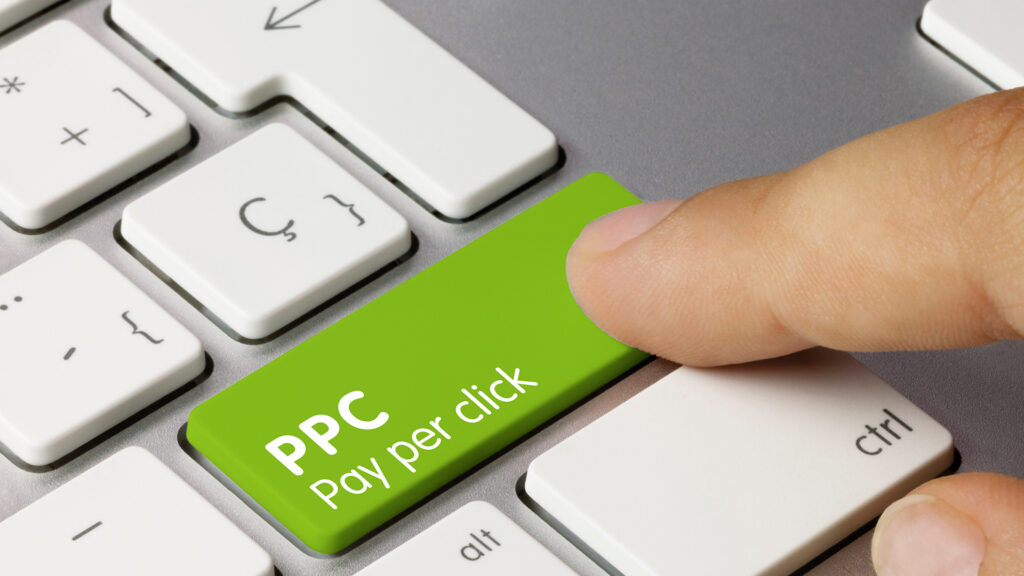The healthcare industry continues to face ongoing challenges in the realm of digital marketing, and this trend shows no signs of slowing down. Pay-per-click (PPC) advertising is a powerful digital marketing tool. By leveraging PPC campaigns, healthcare service providers can effectively target their audience, drive quality leads, and maximize return on investment (ROI). In this blog post, we will share the value of including a PPC advertising campaign in a marketing strategy for a healthcare company. Plus, we will provide valuable tips to help healthcare businesses maximize their ROI and drive quality leads through PPC advertising.
The Benefits of PPC Advertising for Healthcare companies
Enhanced Visibility and Reach:
PPC advertising enhances visibility and reach for healthcare companies through several key mechanisms:
- Targeted Keyword Selection: PPC campaigns allow healthcare companies to select specific keywords relevant to their services. When users search for these keywords, the company’s ads are displayed prominently in search engine results, increasing visibility to a highly targeted audience actively seeking healthcare solutions.
- Ad Placement on Search Engine Results Pages (SERPs): PPC ads appear at the top of search engine results pages, above organic search results. This prime ad placement ensures that healthcare companies’ offerings are prominently displayed, increasing their visibility and attracting the attention of potential patients.
- Geographic Targeting: Healthcare providers often serve specific geographic areas. PPC advertising allows companies to target their ads to particular locations, ensuring that their messages reach the right audience in their service areas. By reaching local patients who are more likely to convert, healthcare companies can maximize their marketing efforts and enhance their visibility within their target market.
- Ad Extensions: PPC platforms offer various ad extensions that enable healthcare companies to enhance their visibility and provide additional relevant information to potential patients. Location extensions, for example, display a company’s address and contact information, making it easier for local patients to find and contact them. Sitelink extensions can direct users to specific pages on the company’s website, highlighting different services or specialties, further increasing visibility and engagement.
- Display Network Advertising: In addition to search engine results, PPC advertising extends to display networks, allowing healthcare companies to showcase their ads on relevant websites, blogs, and news portals. Display network advertising broadens the reach of healthcare companies’ campaigns, exposing their brand and services to a wider audience within the context of related content.
Leveraging PPC advertising, allows healthcare companies to significantly enhance their visibility and reach. They can precisely target keywords, secure prime ad placements on SERPs, utilize ad extensions for additional visibility, geographically target their audience, and expand their reach through display network advertising. These strategies work together to ensure that healthcare companies are highly visible to their target audience, increasing their chances of attracting potential patients and driving conversions.Goo
Cost-Effective Lead Generation:
PPC advertising offers cost-effective lead generation opportunities for healthcare companies through the following ways:
- Pay-per-Click Model: As the name suggests, PPC advertising operates on a pay-per-click model. This means that healthcare companies only pay when a user clicks on their ads, ensuring that they are only charged for actual engagement with their advertisements. This payment structure eliminates wasteful spending on impressions or views that do not result in user interaction, making PPC an efficient and cost-effective advertising approach.
- Targeted Advertising: PPC campaigns allow healthcare companies to precisely target their ads to specific keywords, geographic locations, and demographic segments. This targeting capability ensures that ads are displayed to a relevant and interested audience, increasing the likelihood of generating qualified leads. By reaching users who are actively searching for healthcare services or solutions, healthcare companies can maximize their ad spend by focusing on individuals with a higher probability of conversion.
- Budget Control: PPC platforms provide healthcare companies with complete control over their advertising budget. Advertisers can set daily or monthly spending limits to ensure that their campaigns align with their financial resources. This level of control allows healthcare companies to manage their expenses effectively, prevent overspending, and allocate their budget to the most successful and profitable campaigns.
- Conversion Tracking and Optimization: PPC advertising platforms offer robust tracking and analytics tools that enable healthcare companies to measure the effectiveness of their campaigns. By tracking conversions, such as form submissions, appointment bookings, or phone calls, healthcare companies can assess the ROI of their PPC efforts. This data-driven approach allows them to optimize their campaigns, allocate their budget to high-performing keywords or ad variations, and refine their targeting to generate more cost-effective leads.
- Flexibility and Scalability: PPC campaigns provide healthcare companies with flexibility and scalability in their lead generation efforts. Advertisers can quickly adjust their campaigns based on performance data, refine their targeting, experiment with different ad variations, or pause underperforming campaigns. This agility allows healthcare companies to optimize their campaigns in real-time, ensuring that their budget is utilized effectively and generating the highest quality leads possible
By leveraging the cost-per-click payment model, precise targeting, budget control, conversion tracking, and optimization opportunities, healthcare companies can generate cost-effective leads through PPC advertising. This approach ensures that marketing budget is directed towards engaging with interested users and maximizes the return on investment for healthcare companies’ advertising efforts.
Immediate Results and Measurable Performance:
A PPC campaign provides immediate results and measurable performance for a healthcare company through the following factors:
Quick Implementation: Unlike other marketing channels that require extensive lead time, PPC campaigns can be set up and launched relatively quickly. Once a healthcare company develops its campaign strategy, it can create ad groups, select keywords, and create compelling ad copy within a short span of time. This fast implementation allows healthcare companies to start generating results and attracting potential patients almost instantly.
Instant Visibility: PPC campaigns ensure that healthcare companies’ ads are displayed prominently on search engine results pages (SERPs) or relevant websites as soon as the campaign goes live. This immediate visibility helps increase brand exposure and awareness among the target audience, ensuring that the healthcare company is visible to potential patients right from the start of the campaign.
Real-time Monitoring and Optimization: PPC advertising platforms provide robust analytics and tracking tools that allow healthcare companies to monitor the performance of their campaigns in real-time. Advertisers can assess key metrics such as impressions, clicks, click-through rates (CTRs), conversions, and cost-per-acquisition (CPA) on an ongoing basis. This real-time data empowers healthcare companies to make data-driven decisions, optimize their campaigns, and allocate resources to the most effective keywords, ad variations, or targeting strategies.
A/B Testing and Iterative Improvements: PPC campaigns enable healthcare companies to conduct A/B testing to compare the performance of different ad variations, landing pages, or call-to-action (CTA) messages. By running simultaneous experiments, healthcare companies can identify the best-performing elements and continually refine their campaign components for better results. This iterative improvement process allows for continuous optimization, ensuring that the campaign’s performance is consistently improved over time.
Conversion Tracking and Attribution: PPC platforms offer advanced conversion tracking capabilities, allowing healthcare companies to measure and attribute conversions accurately. Whether it’s a form submission, appointment booking, or phone call, healthcare companies can track and attribute conversions back to specific PPC campaigns, ad groups, or keywords. This attribution data provides valuable insights into the campaign’s effectiveness, allowing healthcare companies to understand which elements drive the most valuable conversions and adjust their strategies accordingly.
a PPC campaign delivers immediate results and offers measurable performance for healthcare companies. The combination of quick implementation, instant visibility, real-time monitoring and optimization, A/B testing, and conversion tracking enables healthcare companies to assess the effectiveness of their campaigns and make data-driven decisions. This agility allows for continuous improvement and ensures that the campaign’s performance is maximized from the outset.

5 Can't Miss Tips for a Healthcare PPC Campaign
Ad Extensions: Take advantage of ad extensions to provide additional information and enhance the visibility of your ads. Utilize location extensions, call extensions, and sitelink extensions to improve user experience and increase engagement.
Landing Page Optimization: Create dedicated landing pages that align with your ad copy and offer valuable information to potential patients. Optimize landing pages for conversion by including clear and compelling CTAs, relevant content, trust elements (such as testimonials or certifications), and easy-to-fill forms.
Conversion Tracking: Implement conversion tracking to measure the effectiveness of your PPC campaigns. Set up tracking for key actions such as form submissions, appointment bookings, or phone calls. This data will help you analyze the ROI of your campaigns and make informed optimizations.
Continuous Monitoring and Optimization: Regularly monitor the performance of your PPC campaigns and make data-driven optimizations. Analyze key metrics like CTR, conversion rates, and cost per conversion. Adjust bidding strategies, ad copy, targeting, and landing pages to improve performance over time.
Competitor Analysis: Keep an eye on your competitors’ PPC campaigns and strategies. Analyze their keywords, ad copy, and landing pages to identify opportunities and differentiate your healthcare services. Incorporate competitive insights into your own campaign strategy.
By implementing these 5 tips, you can create a powerful PPC campaign strategy for your healthcare business. Remember to continually monitor and optimize your campaigns to maximize results and drive quality leads.
Sublime Media Group is a Google Partner with the knowledge and experience to run effective PPC campaigns for healthcare companies. Our website team builds custom landing pages that are optimized for speed and lead generation to maximize PPC campaigns for hospitals, dentists, plastic surgeons, and orthodontists. Are you ready to generate new leads for your business?

